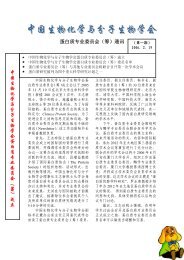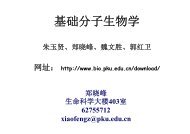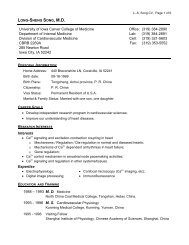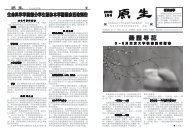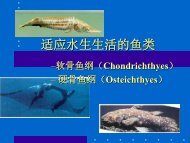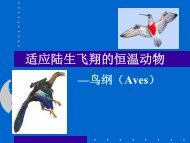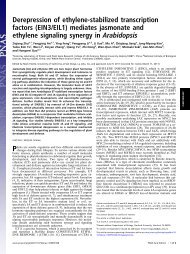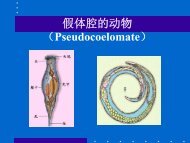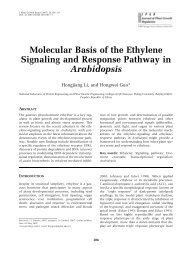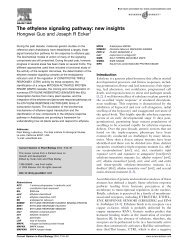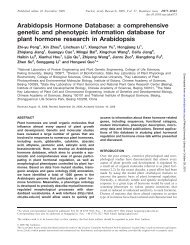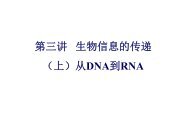Discover
Discover
Discover
Create successful ePaper yourself
Turn your PDF publications into a flip-book with our unique Google optimized e-Paper software.
<strong>Discover</strong><br />
the cellular basis of human disease<br />
Research Masters programme in<br />
Molecular Mechanisms of Disease<br />
• Two-year international MSc<br />
• Honours programme with strict selection (only 30 places)<br />
• Multidisciplinary research<br />
• Collaboration with international institutes<br />
• Tailor-made training and supervision<br />
This programme is accredited by the NVAO, the Dutch-Flemish accreditation organisation,<br />
which is a member of ECA, the European Consortium for Accreditation.
Understanding the cellular<br />
basis of disease<br />
The regulation of cellular processes is crucial for human<br />
development, and maintenance of health throughout life. It is<br />
evident that cellular malfunction is the cause of common multifactorial<br />
diseases such as diabetes, immune and inflammatory<br />
disorders, renal disease, cardiovascular, metabolic and<br />
neurodegenerative diseases as well as obesity and cancer.<br />
In the fight against such diseases, the Nijmegen Centre for<br />
Molecular Life Sciences (NCMLS) Graduate School – which is<br />
part of Radboud University Nijmegen and Radboud University<br />
Nijmegen Medical Centre – plays a key role. A major goal of<br />
the NCMLS is to generate basic research knowledge in the<br />
Molecular Life Sciences and to translate this into clinical<br />
applications, in order to improve diagnostics and develop<br />
new treatments.<br />
The NCMLS offers an exclusive Research Masters programme<br />
in Molecular Mechanisms of Disease (MMD), which is provided<br />
by top researchers and clinicians. The three main themes are:<br />
• Infection, immunity and tissue repair<br />
• Metabolism, transport and motion<br />
• Cell growth and differentiation<br />
An inspiring and challenging programme<br />
This unique programme develops disease-related basic research<br />
in cellular and molecular biology and translates it into clinical<br />
experimental research in patients. Designed to meet the needs<br />
of talented students with the drive, motivation and ambition<br />
to push their scientific careers forward, it represents a unique<br />
opportunity to work on a research project and to build up an<br />
international research network.<br />
Highly selective<br />
This extremely competitive programme provides a sound<br />
balance of theory and practice. We enrol just 30 students<br />
per year, each of whom is allocated a personal mentor as well<br />
as a research supervisor. This selective approach guarantees<br />
excellence, especially during the research training period.<br />
According to one of our international partners, Prof. André<br />
Terzic, MD PhD of the prestigious Mayo Clinic in the USA, the<br />
programme offers a focused combination of didactic and practical<br />
components suited to optimally synthesize current discoveries,<br />
conceptual breakthroughs and technological advancement –<br />
mandatory for the effective education of the new vanguard of<br />
multidisciplinary investigators.<br />
2
Curiosity-driven research<br />
and education<br />
Learning about science in a true research setting<br />
‘I believe that young scientists should be trained in a true research<br />
setting. We offer a multifaceted education in molecular life sciences<br />
related to disease, with a strong emphasis on molecular medicine, cell<br />
biology and translational research. Central to the research school – and<br />
this Masters programme – is our commitment to fundamental research<br />
and its application to novel diagnostics and therapeutics.<br />
Here you’ll get the experience of being part of a leading-edge research<br />
environment and you’ll be trained – and supervised – by excellent<br />
researchers and enthusiastic clinical experts in themes ranging from<br />
infection, immunity and tissue repair, metabolism, transport and<br />
motion to cell growth and differentiation. You’ll also be introduced<br />
to state-of-the-art technology such as molecular imaging, genomics,<br />
proteomics, bioinformatics and cellular therapy.<br />
Collaboration is the key<br />
‘The most successful studies in molecular life sciences are based on<br />
collaboration. With the elucidation of the human genome sequence<br />
and sequences of various model organisms, together with the use of<br />
proteomics to unravel molecular pathways, research opportunities in<br />
molecular life sciences have increased tremendously.<br />
So welcome to the only truly integrative programme of its kind in<br />
Europe. If you’re talented, motivated and looking for thorough,<br />
fundamental, interdisciplinary research training in this area of<br />
expertise, Nijmegen is the place to be.’<br />
Professor Carl Figdor, Director of the Nijmegen Centre for Molecular<br />
Life Sciences and Professor of Tumour Immunology<br />
To understand the molecular mechanisms of disease, collaborations<br />
between scientists and clinicians are of the utmost importance. This<br />
programme gives you an opportunity to experience top-notch research<br />
and to participate in multidisciplinary international teams. You will be<br />
introduced to a range of exciting scientific themes, which will open up<br />
a variety of potential career paths, while giving you the opportunity to<br />
refine your problem-solving capabilities.<br />
There is ample time for practical research training, both here in<br />
Nijmegen and at our international partner institutes. You will learn<br />
how to communicate the results of your research to diverse audiences<br />
and you’ll be trained in writing scientific papers. You will also attend<br />
Master classes led by internationally acknowledged experts in the field.<br />
These are just a few of the things that make this specialised training an<br />
excellent choice for top students with the ambition to participate in an<br />
international PhD programme.’<br />
Professor Frans Cremers, Scientific Programme Director and Professor in<br />
Ophthalmogenetics<br />
3
stanleyson hato (25), a junior scientist at the ncmls<br />
‘Young researchers are taken<br />
seriously here’<br />
‘I’m from the island of Curaçao, which is part of the Dutch Antilles in the Caribbean.<br />
I came here to study Biology and, for my first internship, I joined the Department of<br />
Molecular Biology soon after it had moved into this fabulous new building.<br />
For my second internship I chose a medically applied direction, joining the Department<br />
of Tumour Immunology in the same building. I’ve just started working at the Department<br />
of Medical Microbiology, in the Virology section. I’m investigating how certain viruses<br />
manipulate host cells and circumvent their antiviral mechanisms.<br />
The main strength of studying here is the multidisciplinary collaboration, which leads to<br />
innovation through the integration of ideas. If you feel a particular avenue of inquiry is<br />
interesting but outside of your own field, you can always find experts close by who are only<br />
too willing to help. This was the idea behind the NCMLS building, and I've seen it grow.<br />
They take young researchers like me seriously here. You feel you have a real influence on<br />
the direction of research. For example, right now I'm writing a proposal for funding the<br />
PhD project I intend to work on.’<br />
4
The MSc programme<br />
The MMD programme, which starts each September, is modular<br />
in structure, lasts 24 months and is worth 120 European credits.<br />
Its main goal is to prepare talented, motivated students for<br />
independent research projects, and it provides the basis for<br />
an international PhD degree. There is a strong international<br />
component and an emphasis on a multidisciplinary approach to<br />
answering research questions related to molecular mechanisms<br />
of disease.<br />
Theme 1 Infection, immunity and tissue repair<br />
Sub-themes • Infection and autoimmunity<br />
• Immune regulation<br />
• Tissue engineering and pathology<br />
viral infections and cancer. You also become familiar with<br />
technology platforms which link basic science, technology and<br />
disease such as genomics, proteomics, bioinformatics, cellular<br />
therapy, tissue engineering and molecular imaging. These platforms<br />
are at the forefront of European research in several areas.<br />
International experience<br />
Students participate in exchanges with a number of collaborating<br />
institutes and formal NCMLS partners, including the University<br />
of Southern Denmark, the University of Münster, the Rudolf<br />
Virchow Center for Experimental Biomedicine at Würzburg (both<br />
in Germany), the University of Milano-Bicocco in Italy and the<br />
Mayo Clinic in the USA.<br />
Theme 2<br />
Sub-themes<br />
Theme 3<br />
Sub-themes<br />
Metabolism, transport and motion<br />
• Energy and redox metabolism<br />
• Membrane transport and intracellular motility<br />
Cell growth and differentiation<br />
• Functional genomics<br />
• Neural development<br />
• Signalling networks<br />
• Protein structure and design<br />
Excellent career prospects<br />
This MSc enables you to move rapidly into an international PhD<br />
programme, giving you a more mature perspective and a broader<br />
range of experimental approaches than is possible within a<br />
standard MSc programme. You are also prepared for further<br />
training as a PhD-level researcher. MMD graduates are exempted<br />
from certain elements of the NCMLS PhD programme. For<br />
example, the orientation course taught during the MSc phase<br />
and the main research project can be incorporated into a PhD<br />
project, thus shortening the PhD period by at least 46 EC.<br />
After a number of theoretical components, you choose one of<br />
these three main themes and then specialise in a sub-theme for<br />
the research training period. The general modules are scheduled<br />
mainly in the first year, while the focus in the final year is on<br />
individual research project work leading to your MSc thesis.<br />
There is considerable demand for specialists in fundamental<br />
molecular biology and cell biology as well as in its application<br />
to the treatment of diseases such as cancer, autoimmune and<br />
inflammatory disorders, and metabolic and neurodegenerative<br />
disorders.<br />
Translational research and technology platforms<br />
You are exposed to basic science and links are made to translational<br />
research in the treatment of disease. This is crucial when<br />
studying the molecular mechanisms of the following diseases:<br />
autoimmune and inflammatory disorders (such as rheumatoid<br />
arthritis), renal disease, neurodegenerative diseases, metabolic<br />
disorders, microbial infection (including malarial infections),<br />
Graduates are equipped with highly specialised knowledge of<br />
multidisciplinary research not only in the mechanisms of<br />
disease, but also in state-of-the-art diagnostic methods<br />
and technologies. During the programme you develop a highly<br />
critical, independent approach to problem solving. You will<br />
also acquire the basic management skills needed to lead R&D<br />
projects in the biotechnology and pharmaceutical industries.<br />
5
adriana salcedo (28), a phd student at the ncmls<br />
‘The driving force behind my research?<br />
Fighting malaria’<br />
‘I come from Colombia, where I got my BSc in Medical Microbiology. Since I was young, I've<br />
wanted to go to Europe because of its rich mixture of languages and cultures. Finally, I got the<br />
chance with a Nuffic scholarship to study for an MSc in Biotechnology in the Netherlands.<br />
Right now, I'm working on my PhD in the Molecular Biology lab of the NCMLS. My subject?<br />
Malaria and, in particular, getting a better understanding of gene expression in the parasite<br />
Plasmodium falciparum. I come from a developing country, and I know people personally who<br />
have been sick with malaria. So, the driving force behind my research is to help develop ways<br />
to fight this killer disease.<br />
Besides all that, this is a very stimulating environment to work in. It's multicultural and multidisciplinary<br />
– even within my lab, where two thirds of the people come from abroad. There's<br />
freedom of ideas and freedom to choose your own direction. You really experience the creativity.<br />
It's a great place to learn and, if you feel like me about this, you have the opportunity to make a<br />
genuine contribution to society.’<br />
6
Master classes are given by leading<br />
authorities in their fields from<br />
renowned international institutes<br />
Programme design<br />
Orientation (3 EC)<br />
This is an introduction to the NCMLS scientists, their working<br />
environment, the main research themes and many of the<br />
research techniques and technologies used within the graduate<br />
school.<br />
European Credit Transfer System (ECTS)<br />
The workload of an academic year is equivalent to 60 European<br />
credits (EC). This system allows you to check whether the courses<br />
you have followed in a particular year (along with other activities<br />
that earn credits) meet the European requirements.<br />
International Master classes (6 EC)<br />
This unique component is dedicated to topics within the three<br />
main themes. Distinguished researchers from international<br />
partner universities present the latest research developments<br />
in their field. Six new Master classes are provided over the two<br />
years. These ensure that the programme is continually updated,<br />
keeping abreast with the latest research developments and<br />
introducing you to new and challenging research topics and<br />
questions.<br />
Excellence in communication for scientists (1 EC)<br />
This module focuses on the principles and practice of scientific<br />
writing and presentation skills.<br />
Core Fundamental courses (9 EC)<br />
The three core theme courses Infection, immunity and tissue<br />
repair; Metabolism, transport and motion; and Growth and<br />
differentiation are each worth 3 EC. Researchers from various<br />
disciplines within these themes collaborate closely in<br />
addressing molecular topics related to the mechanisms of<br />
several diseases.<br />
The knowledge transfer, ethics and communication courses are<br />
distinctive in providing a combination of theoretical knowledge,<br />
practical experience and proficiency in scientific communication.<br />
The entire programme is carried out in English.<br />
Knowledge transfer (8 EC)<br />
These courses help to strengthen your scientific communication<br />
and learning skills. You participate in seminars, forums and<br />
conferences related to your particular specialisation (theme and<br />
sub-theme choice) with prominent national and international<br />
scientists. Some of these courses can also be followed at<br />
international partner institutes during the second research<br />
training period.<br />
Translational Research (3 EC)<br />
This component makes the link between basic research and<br />
its application in developing diagnostics and treatments in<br />
a clinical setting.<br />
7
Science and Society (1 EC)<br />
This course trains awareness of the societal impacts of<br />
advances in Molecular Life Sciences and encourages you to<br />
reflect on and discuss related ethical issues.<br />
“A very attractive<br />
multidisciplinary approach<br />
to education in the<br />
biomedical life sciences.<br />
This integrated approach is<br />
necessary in order to<br />
deliver talented young<br />
researchers to the next<br />
phase of their career”<br />
(University of Münster)<br />
Research training (79 EC)<br />
After completing the fundamental core courses, you start a<br />
minor research project on a sub-theme within one of the<br />
NCMLS research groups (34 EC). You learn how to conduct<br />
research under the supervision of internationally prominent<br />
researchers. You then write a report in the form of a scientific<br />
article, which may be published. During the second year, you<br />
embark on a major research project at an international partner<br />
institute (45 EC). This centres on a subject within your main<br />
specialisation, preferably one related to the topic of your minor<br />
research. The results, which should be of publishable quality,<br />
are presented in a final thesis at the end of the programme.<br />
Elective courses (10 EC)<br />
You submit a proposal on the courses you would like to<br />
follow within this flexible part of the programme. You may,<br />
for example, choose to follow components of other related<br />
MSc programmes.<br />
Tailor-made training<br />
Intensive training in basic research techniques is given during<br />
the first few weeks of each research training period. You are<br />
guided throughout the practical training period by a supervisor<br />
and throughout the entire programme by a mentor, who<br />
stimulates you to explore your abilities and develop general<br />
research competencies, including reflection, work organisation<br />
and mid-and long-term planning. Together with these coaches,<br />
you draw up a personal training and supervision plan, which<br />
includes not only practical research but also workshops designed<br />
for and by PhD students as well as seminars and forums within<br />
the institute. Such a broad and interdisciplinary approach to<br />
research is particularly important in the international scientific<br />
arena.<br />
8
mabel van den hoven (26), a phd student at the ncmls<br />
‘Part of a leading-edge research<br />
environment ’<br />
‘I studied Medical Health Sciences in Nijmegen, majoring in Pathobiology. Now I work in the<br />
Nephrology research lab in the NCMLS. This is a small lab in a highly specialised area, with<br />
around 10 people working on four different topics. My research focuses on the mechanisms in<br />
diabetes that lead to kidney disease. The ultimate aim is to find inhibitors which can interrupt<br />
this process.<br />
I really like the challenging environment in the lab, as well as in the NCMLS as a whole. You<br />
feel part of a leading-edge research environment. As a junior researcher you have a great deal<br />
of independence but we also work closely together. Contact with colleagues from different<br />
disciplines makes the work exciting.<br />
There's a good mixture of practice and theory here in Nijmegen, and you learn how to set up<br />
experiments. What's more, you’re exposed to exciting new ideas through lectures, workshops<br />
and forum evenings that are led by experts in their field. That's why I think an MSc in Molecular<br />
Mechanisms of Disease is an excellent preparation for going on to do substantial research for<br />
a PhD.’<br />
9
General information<br />
Admission requirements<br />
This programme was designed for high-calibre students with<br />
a background in life sciences such as Cell Biology, Molecular<br />
Medicine, Biomedical Sciences, Biochemistry, Biotechnology or<br />
Molecular biology. Most applicants intend to follow a PhD programme,<br />
but feel that before doing so they need to deepen their<br />
knowledge and broaden their research and communication skills.<br />
You have a BSc honours degree (or equivalent) and a strong<br />
motivation to pursue a career in research related to the<br />
molecular mechanisms of disease. If your degree is related to,<br />
or one of the subjects listed above and you are among the top<br />
10% of your BSc class, then we have a challenging programme<br />
that will meet or exceed your expectations. A fluent active and<br />
passive command of English is essential.<br />
To find out if you have the right academic background, please<br />
contact Study Advisor Mrs. Margit Sivirsky by sending her an<br />
e-mail at MMD@ncmls.ru.nl.<br />
How to enrol<br />
Applications should be made by 15 th April for non-EEA students<br />
and 1 st June for EEA students. Students with, or expecting, the<br />
equivalent of at least an upper-second class honours degree<br />
(e.g. cum laude) in an appropriate discipline are invited to apply.<br />
Application<br />
You can download and fill in an application form from:<br />
www.ru.nl/master/NCMLS-MMD.<br />
Please send the following documents:<br />
• application form and letter of motivation<br />
• certified copies of your university and pre-university<br />
diplomas (plus English transcripts)<br />
• copy of your English language test (TOEFL: 600 or above<br />
or equivalent test; native speakers and those who studied<br />
BSc in the Netherlands are exempt)<br />
• a copy of your passport<br />
• your Curriculum Vitae<br />
• two letters of recommendation from previous supervisors<br />
Send the application form and documents to:<br />
Radboud University Nijmegen<br />
Central Students’ Office<br />
PO Box 9102, 6500 HC Nijmegen<br />
The Netherlands<br />
We will first determine whether you meet the university’s<br />
general requirements. Potential students will then be asked<br />
for an interview (in person or by telephone) with the Selection<br />
Committee, who will consider whether you are qualified to be<br />
admitted to the Masters programme. You may also be asked to<br />
meet further conditions. For further details of the application<br />
procedure (including how to do the TOEFL test), see<br />
www.ru.nl/master/NCMLS-MMD.<br />
Costs<br />
The MMD programme has been accredited by the Dutch<br />
authorities. This means that Dutch students enrolled in this<br />
10
programme may apply for a government scholarship. For more<br />
details, please go to www.ib-groep.nl. For foreign students<br />
there is the possibility of a scholarship (eg. Huygens).<br />
For more details, please go to www.nuffic.nl/scholarships.<br />
to good public transport connections, cities such as Brussels,<br />
Paris, London, Dublin, Cologne and Frankfurt are only a few<br />
hours away. Within the town itself, however, the best way to<br />
get around is by bicycle.<br />
Students from the European Economic Area (EEA) which<br />
includes the 27 EU countries plus Iceland, Lichtenstein and<br />
Norway, pay the same tuition fee as Dutch students (for the<br />
academich year 2007/2008 : € 1,538 per year). For students<br />
from outside the EEA, the fee was € 8,000 per year in 2006/<br />
2007 (plus a one-off handling charge of € 75). The tuition fee<br />
for 2007/2008 has yet to be decided. For more information, see<br />
www.ru.nl/master/NCMLS-MMD.<br />
Students from abroad should also take living costs into account,<br />
bringing the total cost of studying in Nijmegen to approximately<br />
€ 8,000 a year excluding tuition fees. When applying for a<br />
residence permit at the Dutch consulate in your country of<br />
origin, you must be able to prove that you have sufficient funds<br />
to cover this amount. All foreign students need a residence<br />
permit to study in the Netherlands, and those from outside the<br />
EU are not allowed to work during this period.<br />
Studying in Nijmegen<br />
Located on a green campus in the oldest city in the Netherlands,<br />
Radboud University Nijmegen is a welcoming, forward-looking,<br />
research-based centre of learning that covers the full range of<br />
academic disciplines. It has excellent study facilities and libraries,<br />
new sport facilities and a lively student culture. Almost all of<br />
the teaching staff are involved in both education and research.<br />
This combination offers a dual advantage: research facilities that<br />
attract the brightest and the best, and a stimulating learning<br />
environment that provides access to the latest findings. It’s also<br />
a friendly place to study: students and lecturers know each<br />
other by first name. Each year around 2,000 students graduate<br />
and 185 postgraduates are awarded doctorates.<br />
The town dates back to Roman times, when it was known as<br />
Novio Magus. With a population of 150,000, it has a rich social<br />
and cultural life, including a variety of film, theatre and music<br />
venues, international festivals and sports events. Nijmegen is<br />
easily accessible from all parts of the Netherlands, and, thanks<br />
How to find accommodation<br />
As in the rest of the Netherlands, student housing in Nijmegen<br />
is scarce. There are three ways to find accommodation:<br />
• through the Radboud University External Relations<br />
Department: + 31 24 36 12061 (Monday - Friday<br />
10.00 - 12.00) or housing@er.ru.nl<br />
• through the Nijmegen Foundation for Student<br />
Accommodation (www.sshn.nl)<br />
• or by renting a house or room privately<br />
Check out www.ru.nl/master/NCMLS-MMD for more<br />
information.<br />
Important addresses<br />
MMD Research Masters programme<br />
Scientific programme director: Prof. Frans Cremers<br />
Study Advisor Mrs. Margit Sivirsky<br />
E: MMD@ncmls.ru.nl<br />
T: +31 (0)24 361 89 44<br />
I: www.ru.nl/master/NCMLS-MMD<br />
Central Students’ Office<br />
PO Box 9102, 6500 HC Nijmegen, the Netherlands<br />
T: +31 (0)24 361 23 45<br />
E: balie@dsz.ru.nl<br />
I: www.ru.nl/master<br />
Foundation for Student Accommodation<br />
PO Box 1175, 6501 BD Nijmegen, the Netherlands<br />
T: +31 (0)24 359 49 23<br />
E: info@sshn.nl<br />
Additional information<br />
On accreditation: www.nvao.net<br />
On Nijmegen: www.nijmegenonline.nl<br />
On studying in the Netherlands: www.studyin.nl<br />
On language requirements:<br />
www.ru.nl/prospectivemaster/admission/master/language<br />
11
Date of pubication: February 2007<br />
This brochure is a publication of Radboud University<br />
Nijmegen | Coordination: Communications Office<br />
Text: Michael Gould Associates (in collaboration with<br />
Dr Margaret Mullally, Assistant Scientific Director<br />
NCMLS) | Design: Nies en Partners bno, Nijmegen<br />
Photography: Dick van Aalst, Bert Beelen, Erik van<br />
’t Hullenaar, Frank Muller | Printed by: Thieme<br />
MediaCenter, Nijmegen<br />
While this brochure was prepared with the utmost care,<br />
no representation of accuracy or completeness is made.<br />
We welcome your comments.<br />
Central Student’s Office,<br />
PO Box 9102, 6500 HC Nijmegen,<br />
E-mail: balie@dsz.ru.nl



